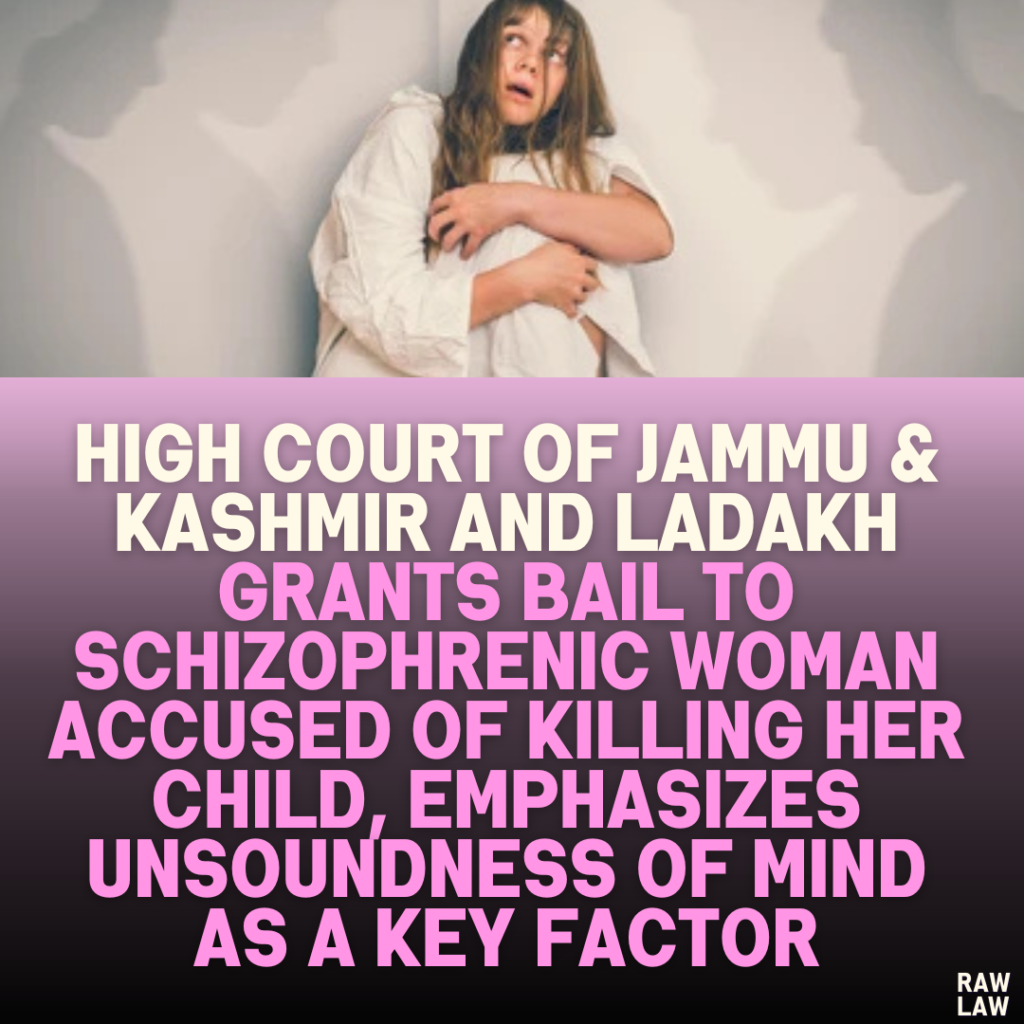1. Court’s Decision
The High Court of Jammu & Kashmir and Ladakh granted bail to the applicant, who was accused of murdering her three-month-old son. The court relied on her diagnosis of schizophrenia and the principle of unsoundness of mind as a defense under Section 84 IPC. It held that continued judicial custody served no purpose, given the applicant’s medical condition and the fact that material witnesses had been examined. The court stated, “No purpose shall be served by keeping the applicant in judicial custody when all the material witnesses have been examined.”
2. Facts
- The applicant faced charges under Sections 302 and 201 IPC for allegedly murdering her three-month-old son by striking him with an axe and attempting to destroy evidence.
- On the day of the incident, a complaint was filed by her brother, stating that she had confessed to killing her son and had attempted to conceal the crime by cleaning the blood and hiding blood-stained clothes.
- Medical evidence presented conflicting views on the applicant’s fitness to stand trial. Initial reports stated she was unfit, but subsequent assessments deemed her capable of understanding legal proceedings.
- The applicant had been in custody for over three years, and of the 26 listed witnesses, 14 had already been examined.
3. Issues
- Whether the applicant’s diagnosis of schizophrenia and defense of unsoundness of mind under Section 84 IPC warranted bail.
- Whether the court could consider the defense of unsoundness of mind at the stage of a bail application or if it was reserved for trial.
- Whether continued detention was necessary, given the progress of the trial and the applicant’s medical condition.
4. Petitioner’s Arguments
The applicant’s counsel argued:
- The diagnosis of schizophrenia, a chronic mental disorder, indicated that the applicant was incapable of forming the necessary intent (mens rea) to commit the offense.
- The applicant qualified for immunity under Section 84 IPC, which exempts persons of unsound mind from criminal liability.
- Since the applicant was a sick woman, proviso to Section 437(1) Cr.P.C. entitled her to bail, especially given her prolonged custody of over three years.
- The absence of a motive for the crime further pointed to the likelihood that her actions were a result of her mental condition rather than premeditation.
5. Respondent’s Arguments
The prosecution contended:
- The defense of unsoundness of mind under Section 84 IPC was a matter for trial and not relevant at the stage of a bail application.
- The applicant’s alleged acts of tampering with evidence (cleaning the blood and hiding her clothes) indicated deliberate intent and could not be overlooked.
- The severity of the charges—murder of a child—necessitated denying bail to the applicant to ensure justice.
6. Analysis of the Law
- The court examined Section 84 IPC, which provides immunity to individuals incapable of understanding the nature of their actions due to unsoundness of mind. It found the applicant’s schizophrenia relevant to her defense.
- The proviso to Section 437(1) Cr.P.C. allows bail for women, sick persons, or infirm individuals. As the applicant is a woman suffering from schizophrenia, the court acknowledged this as a mitigating factor.
- The absence of a motive, combined with the applicant’s mental health condition, weakened the argument for deliberate intent to commit murder.
7. Precedent Analysis
The court referred to the Gauhati High Court’s judgment in Bangla Bagti v. State of Assam (2012), which elaborated on the debilitating effects of schizophrenia. It cited medical and legal definitions to underscore the impact of the illness on cognitive abilities and behavior, emphasizing its recognition as a defense in criminal law.
8. Court’s Reasoning
- Mental Health Condition: The court acknowledged the applicant’s schizophrenia diagnosis as a critical factor. The absence of motive or prior animosity made it improbable for her to have acted with rational intent.
- Witness Examination: The court noted that most material witnesses had been examined, and the complainant (her brother) had turned hostile, reducing the strength of the prosecution’s case.
- Custodial Impact: Keeping the applicant in custody was deemed unnecessary since her medical condition required continuous care. The court observed that the defense of unsoundness of mind, while typically considered during trial, was significant enough to warrant bail in this case.
9. Conclusion
The High Court allowed the bail application with conditions:
- The applicant’s father would provide surety for ₹50,000.
- The applicant would file a personal bond of the same amount.
- The applicant’s mental health would be monitored monthly by the Psychiatric Disease Hospital, Jammu, with provisions for hospitalization if her condition deteriorated.
The court emphasized that these conditions aimed to ensure the applicant’s well-being while maintaining judicial oversight.
10. Implications
- Balancing Justice and Compassion: The judgment highlights the court’s sensitivity to mental health issues in criminal cases, reaffirming the principle that justice must account for the accused’s condition.
- Defense of Unsoundness of Mind: The ruling underscores the importance of Section 84 IPC as a safeguard for individuals with mental illnesses, even at the bail stage.
- Judicial Efficiency: By granting bail, the court aimed to minimize unnecessary custody in cases where trial proceedings were unlikely to be significantly affected.



